Australian Drug and Alcohol Legislation: Policy Evaluation and Impact
VerifiedAdded on 2023/01/19
|6
|1474
|34
Essay
AI Summary
This essay evaluates two key legislations in Australia concerning alcohol and drug governance: the Drug Misuse and Trafficking Act 1985 and the Drug and Alcohol Treatment Act 2007. It examines the provisions of these acts, including prohibitions on drug-related activities and the provision of treatment for addiction, and how they address alcohol and drug abuse. The paper also assesses the effectiveness of these policies by analyzing statistical data on alcohol and drug use, including the impact on consumers and carers. While acknowledging some limitations, the essay concludes that these laws play a crucial role in governing illegal substance use and assisting individuals struggling with addiction. The Drug Misuse and Trafficking Act focuses on prohibiting drug-related activities, while the Drug and Alcohol Treatment Act aims to provide treatment and support for those with addictions. The analysis also considers the increasing use of medical marijuana and the Involuntary Drug and Alcohol Treatment Program's impact.
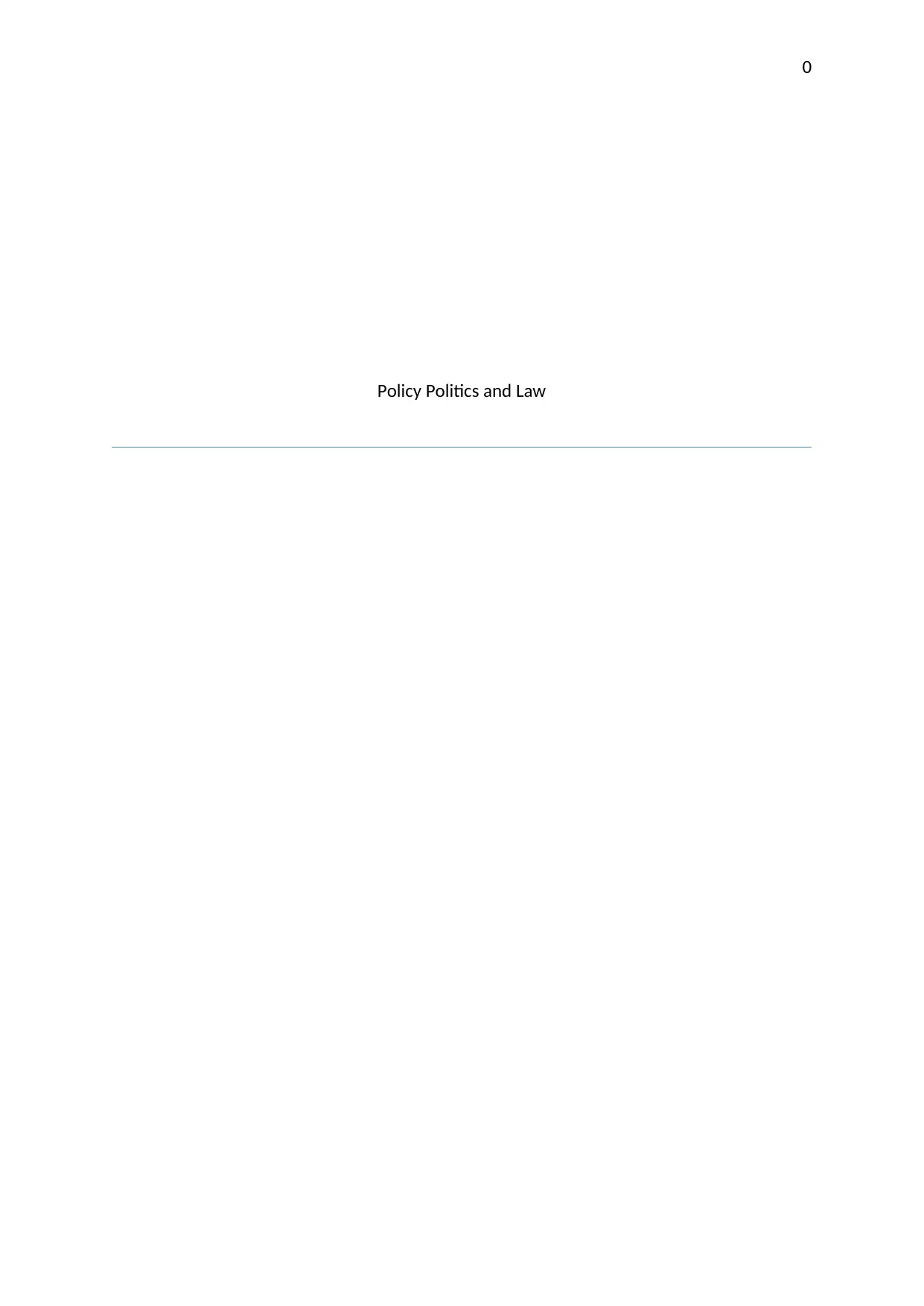
0
Policy Politics and Law
Policy Politics and Law
Paraphrase This Document
Need a fresh take? Get an instant paraphrase of this document with our AI Paraphraser
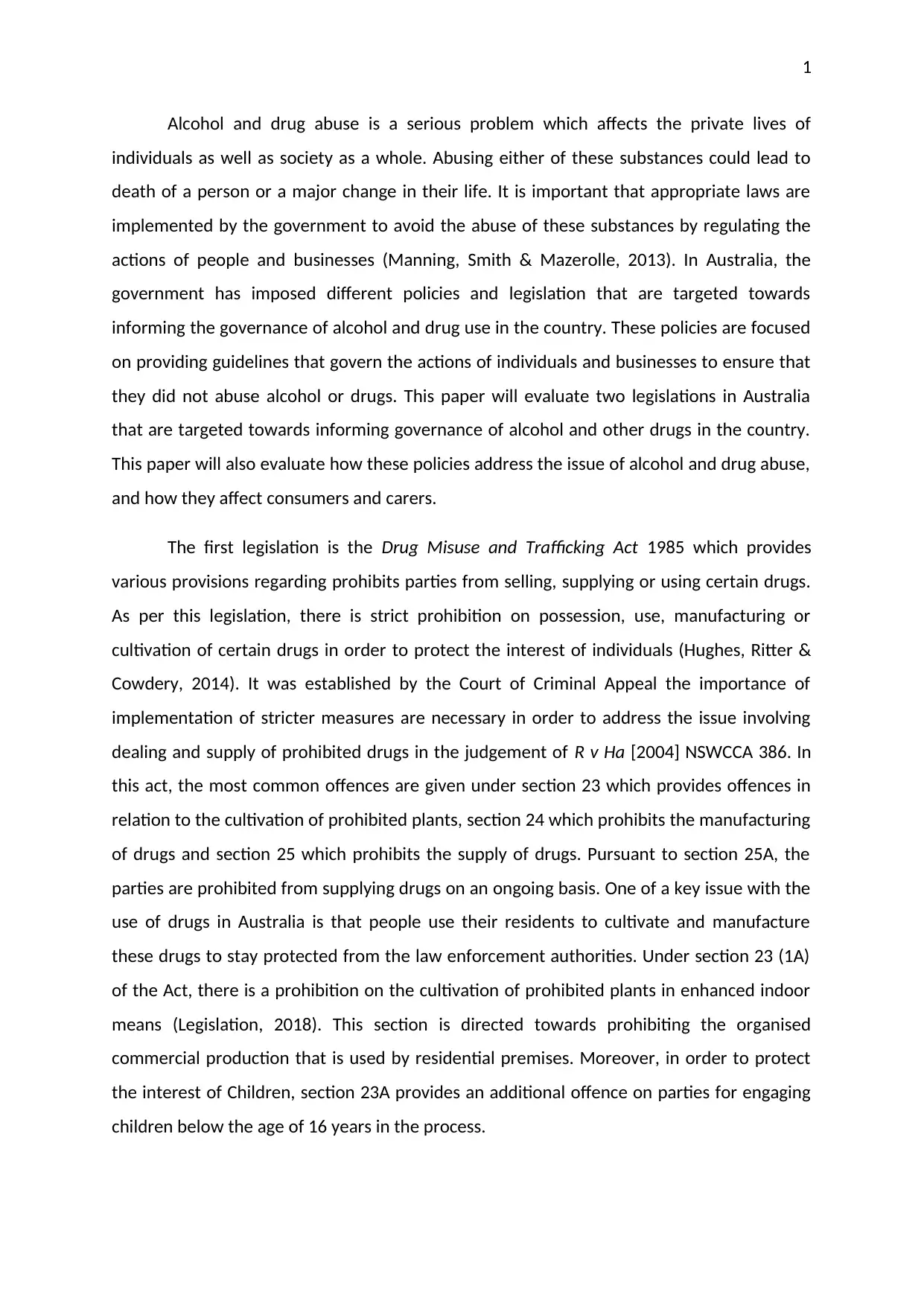
1
Alcohol and drug abuse is a serious problem which affects the private lives of
individuals as well as society as a whole. Abusing either of these substances could lead to
death of a person or a major change in their life. It is important that appropriate laws are
implemented by the government to avoid the abuse of these substances by regulating the
actions of people and businesses (Manning, Smith & Mazerolle, 2013). In Australia, the
government has imposed different policies and legislation that are targeted towards
informing the governance of alcohol and drug use in the country. These policies are focused
on providing guidelines that govern the actions of individuals and businesses to ensure that
they did not abuse alcohol or drugs. This paper will evaluate two legislations in Australia
that are targeted towards informing governance of alcohol and other drugs in the country.
This paper will also evaluate how these policies address the issue of alcohol and drug abuse,
and how they affect consumers and carers.
The first legislation is the Drug Misuse and Trafficking Act 1985 which provides
various provisions regarding prohibits parties from selling, supplying or using certain drugs.
As per this legislation, there is strict prohibition on possession, use, manufacturing or
cultivation of certain drugs in order to protect the interest of individuals (Hughes, Ritter &
Cowdery, 2014). It was established by the Court of Criminal Appeal the importance of
implementation of stricter measures are necessary in order to address the issue involving
dealing and supply of prohibited drugs in the judgement of R v Ha [2004] NSWCCA 386. In
this act, the most common offences are given under section 23 which provides offences in
relation to the cultivation of prohibited plants, section 24 which prohibits the manufacturing
of drugs and section 25 which prohibits the supply of drugs. Pursuant to section 25A, the
parties are prohibited from supplying drugs on an ongoing basis. One of a key issue with the
use of drugs in Australia is that people use their residents to cultivate and manufacture
these drugs to stay protected from the law enforcement authorities. Under section 23 (1A)
of the Act, there is a prohibition on the cultivation of prohibited plants in enhanced indoor
means (Legislation, 2018). This section is directed towards prohibiting the organised
commercial production that is used by residential premises. Moreover, in order to protect
the interest of Children, section 23A provides an additional offence on parties for engaging
children below the age of 16 years in the process.
Alcohol and drug abuse is a serious problem which affects the private lives of
individuals as well as society as a whole. Abusing either of these substances could lead to
death of a person or a major change in their life. It is important that appropriate laws are
implemented by the government to avoid the abuse of these substances by regulating the
actions of people and businesses (Manning, Smith & Mazerolle, 2013). In Australia, the
government has imposed different policies and legislation that are targeted towards
informing the governance of alcohol and drug use in the country. These policies are focused
on providing guidelines that govern the actions of individuals and businesses to ensure that
they did not abuse alcohol or drugs. This paper will evaluate two legislations in Australia
that are targeted towards informing governance of alcohol and other drugs in the country.
This paper will also evaluate how these policies address the issue of alcohol and drug abuse,
and how they affect consumers and carers.
The first legislation is the Drug Misuse and Trafficking Act 1985 which provides
various provisions regarding prohibits parties from selling, supplying or using certain drugs.
As per this legislation, there is strict prohibition on possession, use, manufacturing or
cultivation of certain drugs in order to protect the interest of individuals (Hughes, Ritter &
Cowdery, 2014). It was established by the Court of Criminal Appeal the importance of
implementation of stricter measures are necessary in order to address the issue involving
dealing and supply of prohibited drugs in the judgement of R v Ha [2004] NSWCCA 386. In
this act, the most common offences are given under section 23 which provides offences in
relation to the cultivation of prohibited plants, section 24 which prohibits the manufacturing
of drugs and section 25 which prohibits the supply of drugs. Pursuant to section 25A, the
parties are prohibited from supplying drugs on an ongoing basis. One of a key issue with the
use of drugs in Australia is that people use their residents to cultivate and manufacture
these drugs to stay protected from the law enforcement authorities. Under section 23 (1A)
of the Act, there is a prohibition on the cultivation of prohibited plants in enhanced indoor
means (Legislation, 2018). This section is directed towards prohibiting the organised
commercial production that is used by residential premises. Moreover, in order to protect
the interest of Children, section 23A provides an additional offence on parties for engaging
children below the age of 16 years in the process.
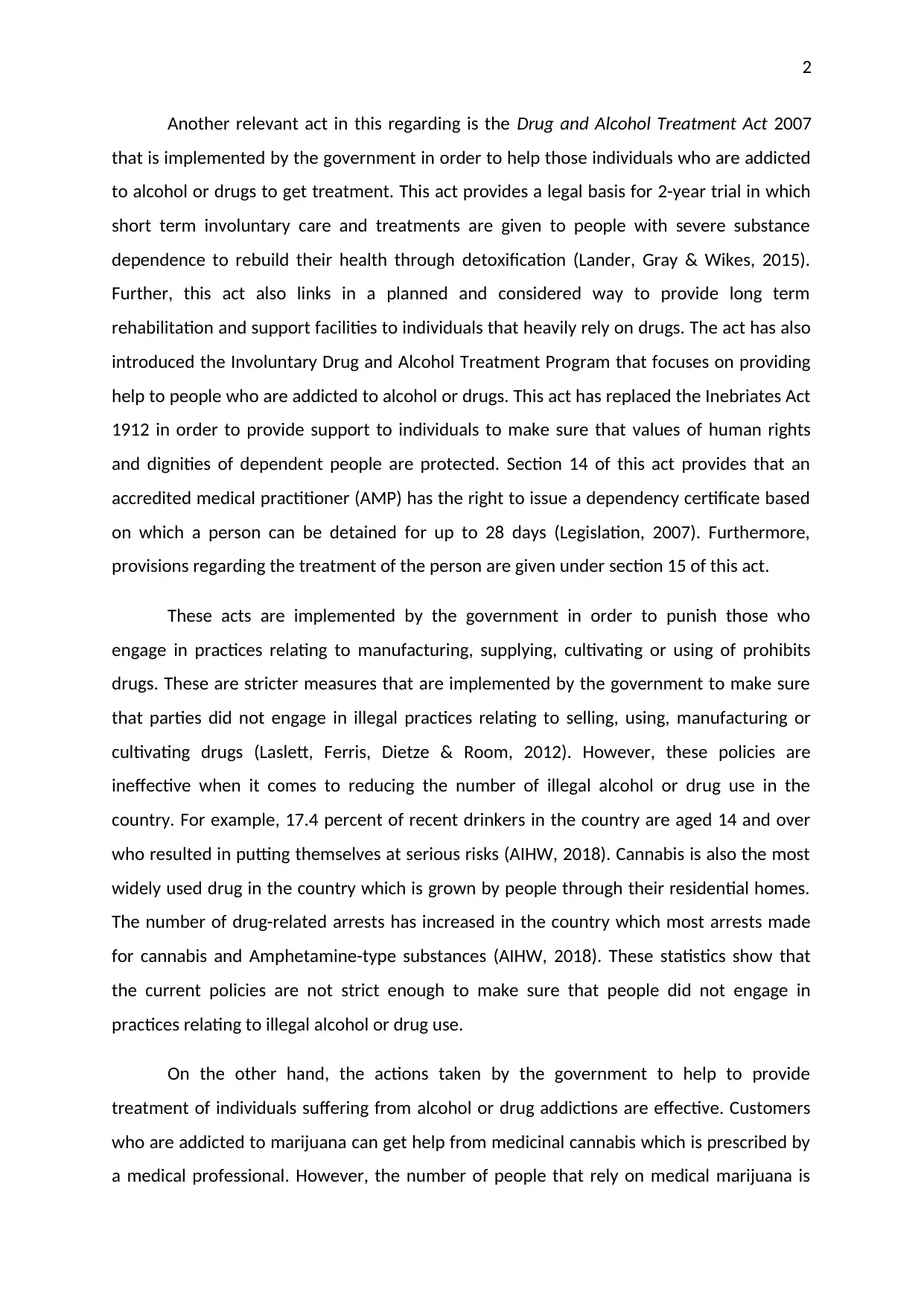
2
Another relevant act in this regarding is the Drug and Alcohol Treatment Act 2007
that is implemented by the government in order to help those individuals who are addicted
to alcohol or drugs to get treatment. This act provides a legal basis for 2-year trial in which
short term involuntary care and treatments are given to people with severe substance
dependence to rebuild their health through detoxification (Lander, Gray & Wikes, 2015).
Further, this act also links in a planned and considered way to provide long term
rehabilitation and support facilities to individuals that heavily rely on drugs. The act has also
introduced the Involuntary Drug and Alcohol Treatment Program that focuses on providing
help to people who are addicted to alcohol or drugs. This act has replaced the Inebriates Act
1912 in order to provide support to individuals to make sure that values of human rights
and dignities of dependent people are protected. Section 14 of this act provides that an
accredited medical practitioner (AMP) has the right to issue a dependency certificate based
on which a person can be detained for up to 28 days (Legislation, 2007). Furthermore,
provisions regarding the treatment of the person are given under section 15 of this act.
These acts are implemented by the government in order to punish those who
engage in practices relating to manufacturing, supplying, cultivating or using of prohibits
drugs. These are stricter measures that are implemented by the government to make sure
that parties did not engage in illegal practices relating to selling, using, manufacturing or
cultivating drugs (Laslett, Ferris, Dietze & Room, 2012). However, these policies are
ineffective when it comes to reducing the number of illegal alcohol or drug use in the
country. For example, 17.4 percent of recent drinkers in the country are aged 14 and over
who resulted in putting themselves at serious risks (AIHW, 2018). Cannabis is also the most
widely used drug in the country which is grown by people through their residential homes.
The number of drug-related arrests has increased in the country which most arrests made
for cannabis and Amphetamine-type substances (AIHW, 2018). These statistics show that
the current policies are not strict enough to make sure that people did not engage in
practices relating to illegal alcohol or drug use.
On the other hand, the actions taken by the government to help to provide
treatment of individuals suffering from alcohol or drug addictions are effective. Customers
who are addicted to marijuana can get help from medicinal cannabis which is prescribed by
a medical professional. However, the number of people that rely on medical marijuana is
Another relevant act in this regarding is the Drug and Alcohol Treatment Act 2007
that is implemented by the government in order to help those individuals who are addicted
to alcohol or drugs to get treatment. This act provides a legal basis for 2-year trial in which
short term involuntary care and treatments are given to people with severe substance
dependence to rebuild their health through detoxification (Lander, Gray & Wikes, 2015).
Further, this act also links in a planned and considered way to provide long term
rehabilitation and support facilities to individuals that heavily rely on drugs. The act has also
introduced the Involuntary Drug and Alcohol Treatment Program that focuses on providing
help to people who are addicted to alcohol or drugs. This act has replaced the Inebriates Act
1912 in order to provide support to individuals to make sure that values of human rights
and dignities of dependent people are protected. Section 14 of this act provides that an
accredited medical practitioner (AMP) has the right to issue a dependency certificate based
on which a person can be detained for up to 28 days (Legislation, 2007). Furthermore,
provisions regarding the treatment of the person are given under section 15 of this act.
These acts are implemented by the government in order to punish those who
engage in practices relating to manufacturing, supplying, cultivating or using of prohibits
drugs. These are stricter measures that are implemented by the government to make sure
that parties did not engage in illegal practices relating to selling, using, manufacturing or
cultivating drugs (Laslett, Ferris, Dietze & Room, 2012). However, these policies are
ineffective when it comes to reducing the number of illegal alcohol or drug use in the
country. For example, 17.4 percent of recent drinkers in the country are aged 14 and over
who resulted in putting themselves at serious risks (AIHW, 2018). Cannabis is also the most
widely used drug in the country which is grown by people through their residential homes.
The number of drug-related arrests has increased in the country which most arrests made
for cannabis and Amphetamine-type substances (AIHW, 2018). These statistics show that
the current policies are not strict enough to make sure that people did not engage in
practices relating to illegal alcohol or drug use.
On the other hand, the actions taken by the government to help to provide
treatment of individuals suffering from alcohol or drug addictions are effective. Customers
who are addicted to marijuana can get help from medicinal cannabis which is prescribed by
a medical professional. However, the number of people that rely on medical marijuana is
⊘ This is a preview!⊘
Do you want full access?
Subscribe today to unlock all pages.

Trusted by 1+ million students worldwide
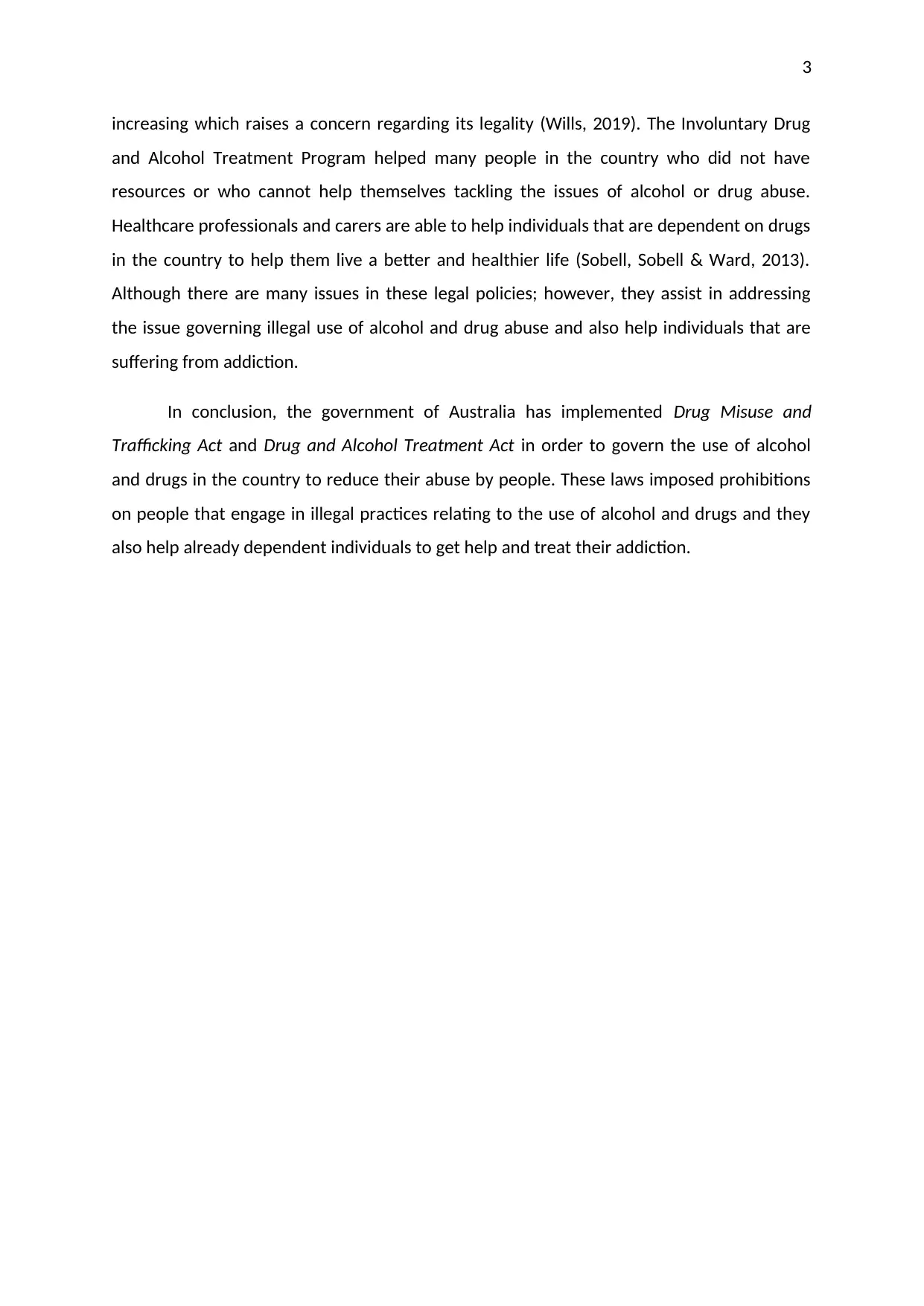
3
increasing which raises a concern regarding its legality (Wills, 2019). The Involuntary Drug
and Alcohol Treatment Program helped many people in the country who did not have
resources or who cannot help themselves tackling the issues of alcohol or drug abuse.
Healthcare professionals and carers are able to help individuals that are dependent on drugs
in the country to help them live a better and healthier life (Sobell, Sobell & Ward, 2013).
Although there are many issues in these legal policies; however, they assist in addressing
the issue governing illegal use of alcohol and drug abuse and also help individuals that are
suffering from addiction.
In conclusion, the government of Australia has implemented Drug Misuse and
Trafficking Act and Drug and Alcohol Treatment Act in order to govern the use of alcohol
and drugs in the country to reduce their abuse by people. These laws imposed prohibitions
on people that engage in illegal practices relating to the use of alcohol and drugs and they
also help already dependent individuals to get help and treat their addiction.
increasing which raises a concern regarding its legality (Wills, 2019). The Involuntary Drug
and Alcohol Treatment Program helped many people in the country who did not have
resources or who cannot help themselves tackling the issues of alcohol or drug abuse.
Healthcare professionals and carers are able to help individuals that are dependent on drugs
in the country to help them live a better and healthier life (Sobell, Sobell & Ward, 2013).
Although there are many issues in these legal policies; however, they assist in addressing
the issue governing illegal use of alcohol and drug abuse and also help individuals that are
suffering from addiction.
In conclusion, the government of Australia has implemented Drug Misuse and
Trafficking Act and Drug and Alcohol Treatment Act in order to govern the use of alcohol
and drugs in the country to reduce their abuse by people. These laws imposed prohibitions
on people that engage in illegal practices relating to the use of alcohol and drugs and they
also help already dependent individuals to get help and treat their addiction.
Paraphrase This Document
Need a fresh take? Get an instant paraphrase of this document with our AI Paraphraser
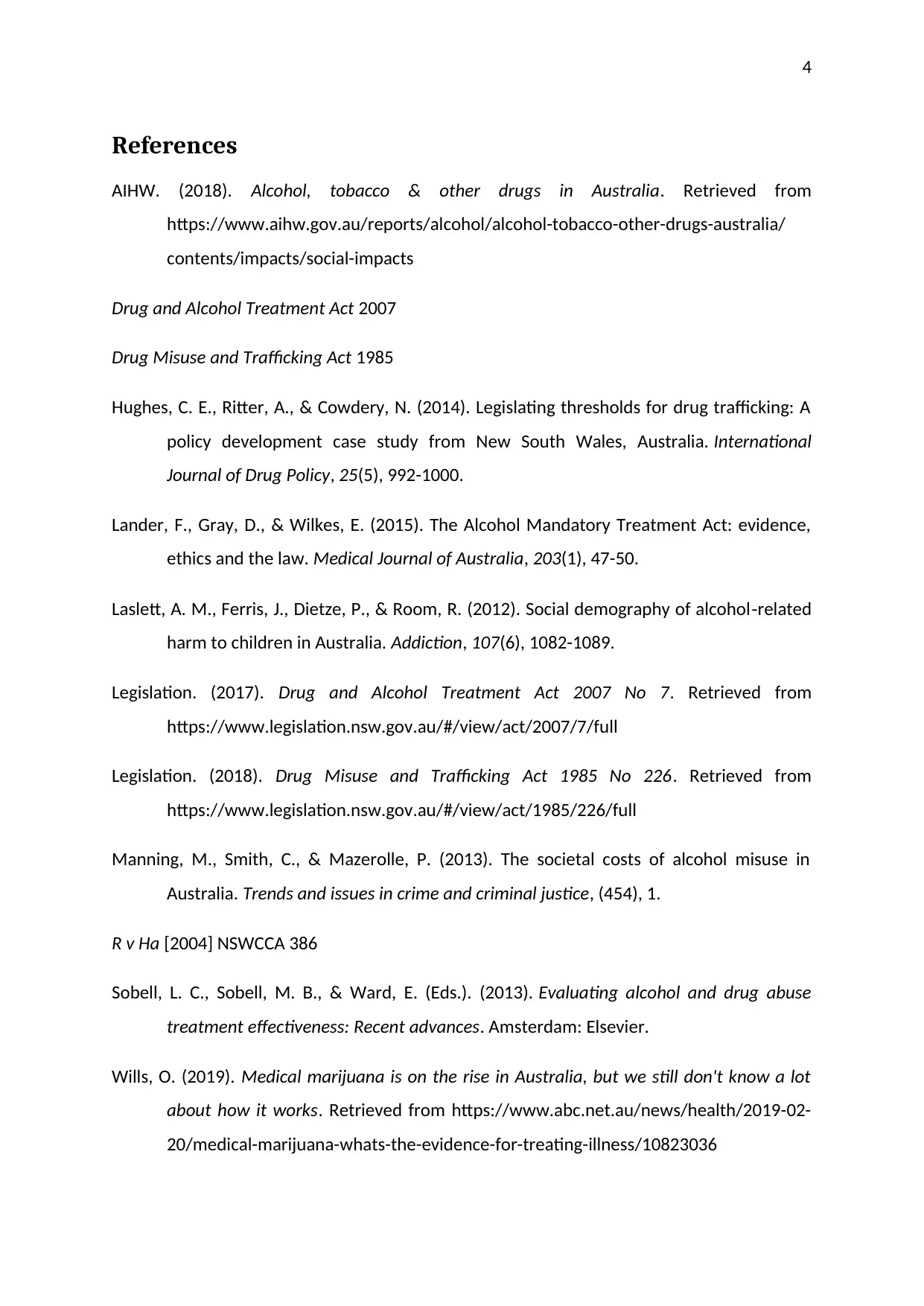
4
References
AIHW. (2018). Alcohol, tobacco & other drugs in Australia. Retrieved from
https://www.aihw.gov.au/reports/alcohol/alcohol-tobacco-other-drugs-australia/
contents/impacts/social-impacts
Drug and Alcohol Treatment Act 2007
Drug Misuse and Trafficking Act 1985
Hughes, C. E., Ritter, A., & Cowdery, N. (2014). Legislating thresholds for drug trafficking: A
policy development case study from New South Wales, Australia. International
Journal of Drug Policy, 25(5), 992-1000.
Lander, F., Gray, D., & Wilkes, E. (2015). The Alcohol Mandatory Treatment Act: evidence,
ethics and the law. Medical Journal of Australia, 203(1), 47-50.
Laslett, A. M., Ferris, J., Dietze, P., & Room, R. (2012). Social demography of alcohol‐related
harm to children in Australia. Addiction, 107(6), 1082-1089.
Legislation. (2017). Drug and Alcohol Treatment Act 2007 No 7. Retrieved from
https://www.legislation.nsw.gov.au/#/view/act/2007/7/full
Legislation. (2018). Drug Misuse and Trafficking Act 1985 No 226. Retrieved from
https://www.legislation.nsw.gov.au/#/view/act/1985/226/full
Manning, M., Smith, C., & Mazerolle, P. (2013). The societal costs of alcohol misuse in
Australia. Trends and issues in crime and criminal justice, (454), 1.
R v Ha [2004] NSWCCA 386
Sobell, L. C., Sobell, M. B., & Ward, E. (Eds.). (2013). Evaluating alcohol and drug abuse
treatment effectiveness: Recent advances. Amsterdam: Elsevier.
Wills, O. (2019). Medical marijuana is on the rise in Australia, but we still don't know a lot
about how it works. Retrieved from https://www.abc.net.au/news/health/2019-02-
20/medical-marijuana-whats-the-evidence-for-treating-illness/10823036
References
AIHW. (2018). Alcohol, tobacco & other drugs in Australia. Retrieved from
https://www.aihw.gov.au/reports/alcohol/alcohol-tobacco-other-drugs-australia/
contents/impacts/social-impacts
Drug and Alcohol Treatment Act 2007
Drug Misuse and Trafficking Act 1985
Hughes, C. E., Ritter, A., & Cowdery, N. (2014). Legislating thresholds for drug trafficking: A
policy development case study from New South Wales, Australia. International
Journal of Drug Policy, 25(5), 992-1000.
Lander, F., Gray, D., & Wilkes, E. (2015). The Alcohol Mandatory Treatment Act: evidence,
ethics and the law. Medical Journal of Australia, 203(1), 47-50.
Laslett, A. M., Ferris, J., Dietze, P., & Room, R. (2012). Social demography of alcohol‐related
harm to children in Australia. Addiction, 107(6), 1082-1089.
Legislation. (2017). Drug and Alcohol Treatment Act 2007 No 7. Retrieved from
https://www.legislation.nsw.gov.au/#/view/act/2007/7/full
Legislation. (2018). Drug Misuse and Trafficking Act 1985 No 226. Retrieved from
https://www.legislation.nsw.gov.au/#/view/act/1985/226/full
Manning, M., Smith, C., & Mazerolle, P. (2013). The societal costs of alcohol misuse in
Australia. Trends and issues in crime and criminal justice, (454), 1.
R v Ha [2004] NSWCCA 386
Sobell, L. C., Sobell, M. B., & Ward, E. (Eds.). (2013). Evaluating alcohol and drug abuse
treatment effectiveness: Recent advances. Amsterdam: Elsevier.
Wills, O. (2019). Medical marijuana is on the rise in Australia, but we still don't know a lot
about how it works. Retrieved from https://www.abc.net.au/news/health/2019-02-
20/medical-marijuana-whats-the-evidence-for-treating-illness/10823036

5
⊘ This is a preview!⊘
Do you want full access?
Subscribe today to unlock all pages.

Trusted by 1+ million students worldwide
1 out of 6
Related Documents
Your All-in-One AI-Powered Toolkit for Academic Success.
+13062052269
info@desklib.com
Available 24*7 on WhatsApp / Email
![[object Object]](/_next/static/media/star-bottom.7253800d.svg)
Unlock your academic potential
Copyright © 2020–2026 A2Z Services. All Rights Reserved. Developed and managed by ZUCOL.





